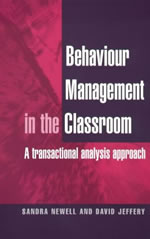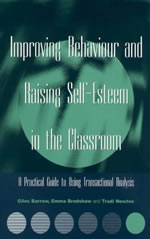BEHAVIOUR MANAGEMENT IN THE CLASSROOM: A Transactional Analysis Approach

Buy from Amazon.co.uk
by Sandra Newell and David Jeffery
DAVID FULTON (2002) ISBN 1853468266 £15.00 142PP
IMPROVING BEHAVIOUR AND RAISING SELF-ESTEEM IN THE CLASSROOM: A Practical Guide to Using Transactional Analysis

Buy from Amazon.co.uk
by Giles Barrow, Emma Bradshaw and Trudi Nugent.
DAVID FULTON (2001) ISBN 1853467758 £14.00 136PP
These two books are inspired by the writing of Eric Berne, the psychiatrist and psychotherapist who made a major impact in the 60s and 70s drawing on psychoanalytic and humanistic ideas to construct the theory and practice of transactional analysis. He created a new language that became immediately popular by virtue of its simplicity and directness. It was he who highlighted the 'adult', 'child' and 'parent' ways in which we conduct our lives and the 'games' that we play living out our 'life scripts'.
The application of these ideas into the field of education, especially behaviour management, is a refreshing addition to so much current literature that seems steeped in earnest worry about matters of discipline. These books, in contrast, are fun to read. They build on the three basic assumptions that underlie the theory of transactional analysis: 'People are OK. Everyone has the capacity to think. People decide their own destiny and these decisions can be changed.' With these starters, the authors set out in a spirit of optimism, yet always they are practical and keep their feet on the ground, they focus on building and maintaining relationships in the classroom, structuring lessons, dealing with conflict, planning partnerships, developing a positive school culture.
There is a touch of lightness about the writing which is very engaging; however, unless care is taken to keep in mind the complexity of the theoretical ideas, the books might well come over occasionally as slightly naive. Too often there is a sense that all the teacher has to do is to retain his or her 'adult state' against the odds, or miraculously, at the behest of some sublime conscious will, simply 'use other ego states' as seems to befit the occasion.
This is a minor concern, however, more than offset by the insights that the authors give into the diverse and interesting interactions that are initiated and driven by the past and current experiences of both pupils and teachers. The understanding of how these experiences are enacted often unwittingly through various transactions and 'games' is absolutely crucial for the sake of teachers' capacity to deal with what is happening in their classrooms and indeed for their sanity.
PETER WILSON
Peter Wilson is a child psychotherapist and director of YoungMinds
Buy Behaviour Management in the Classroom and Improving Behaviour and Raising Self-esteem in the Classroom from Amazon.co.uk |


